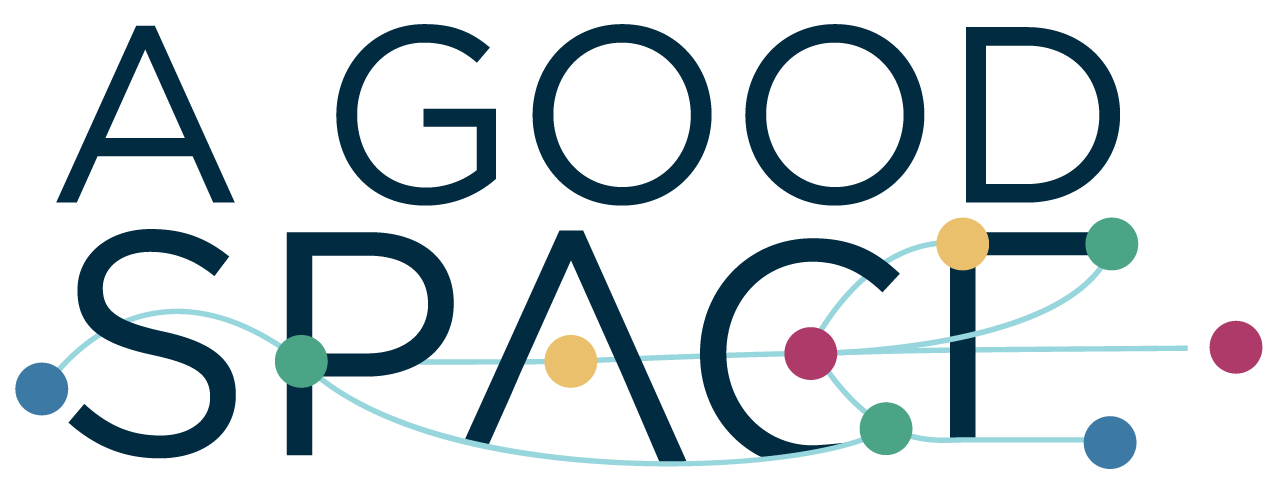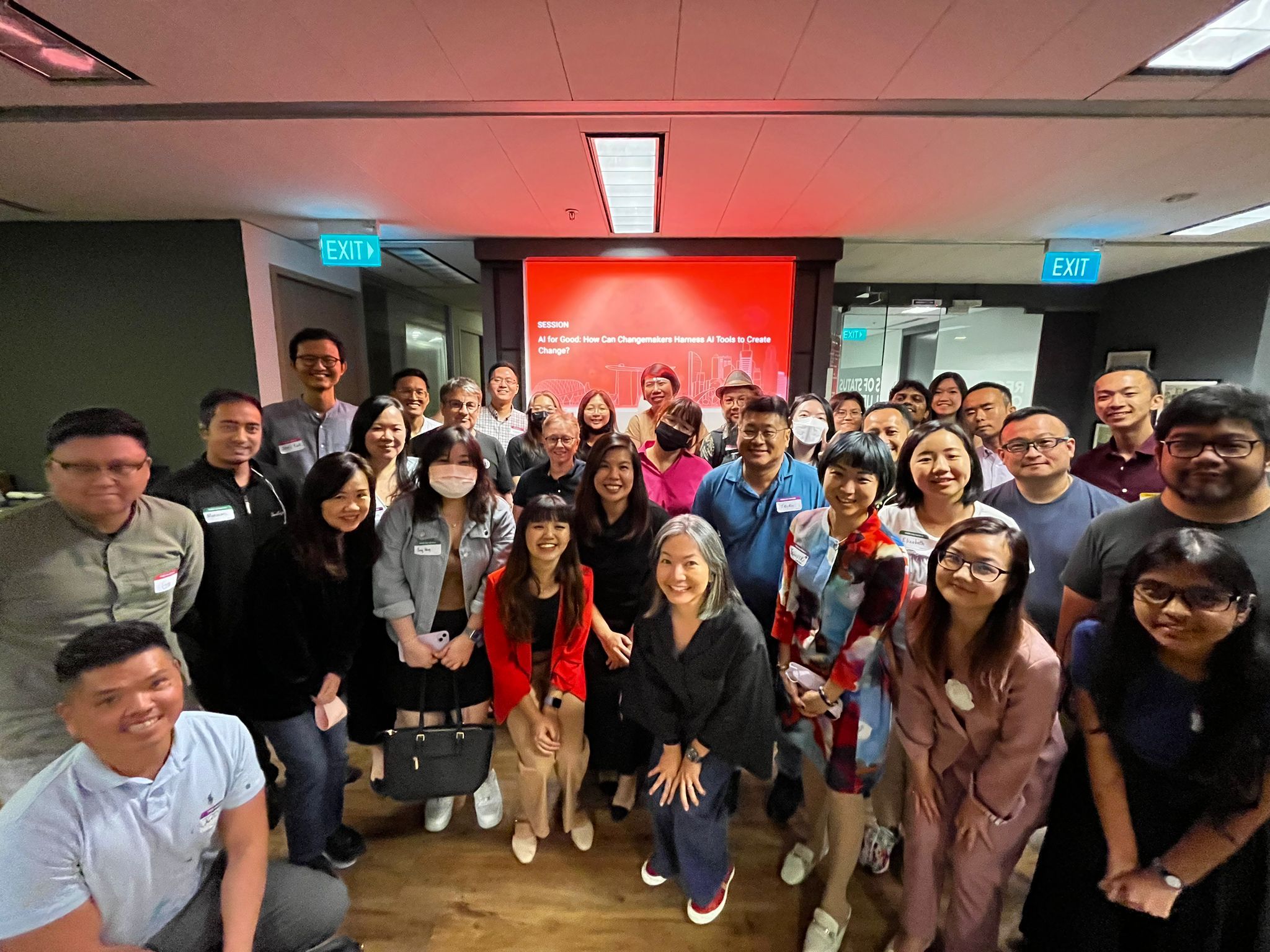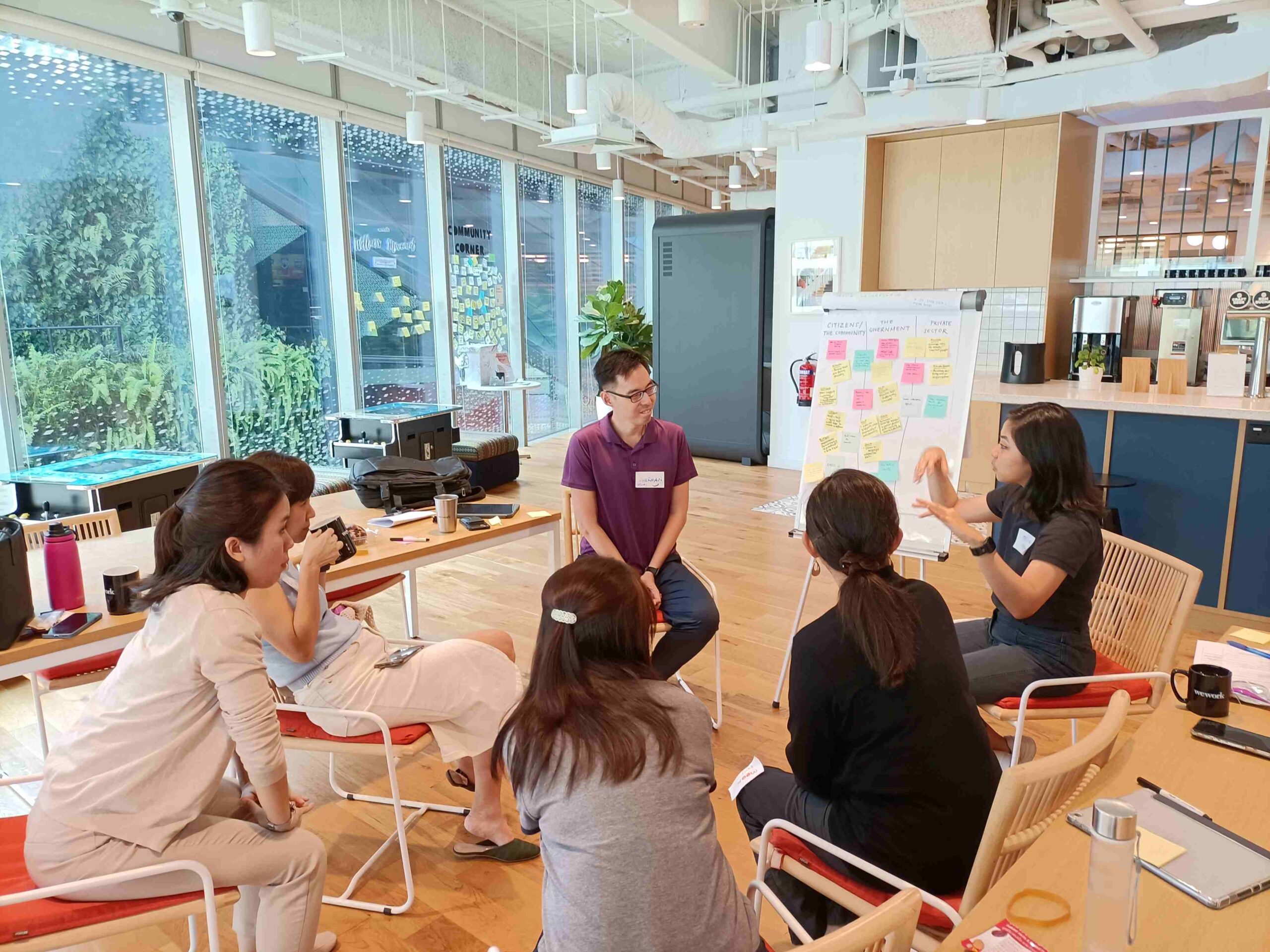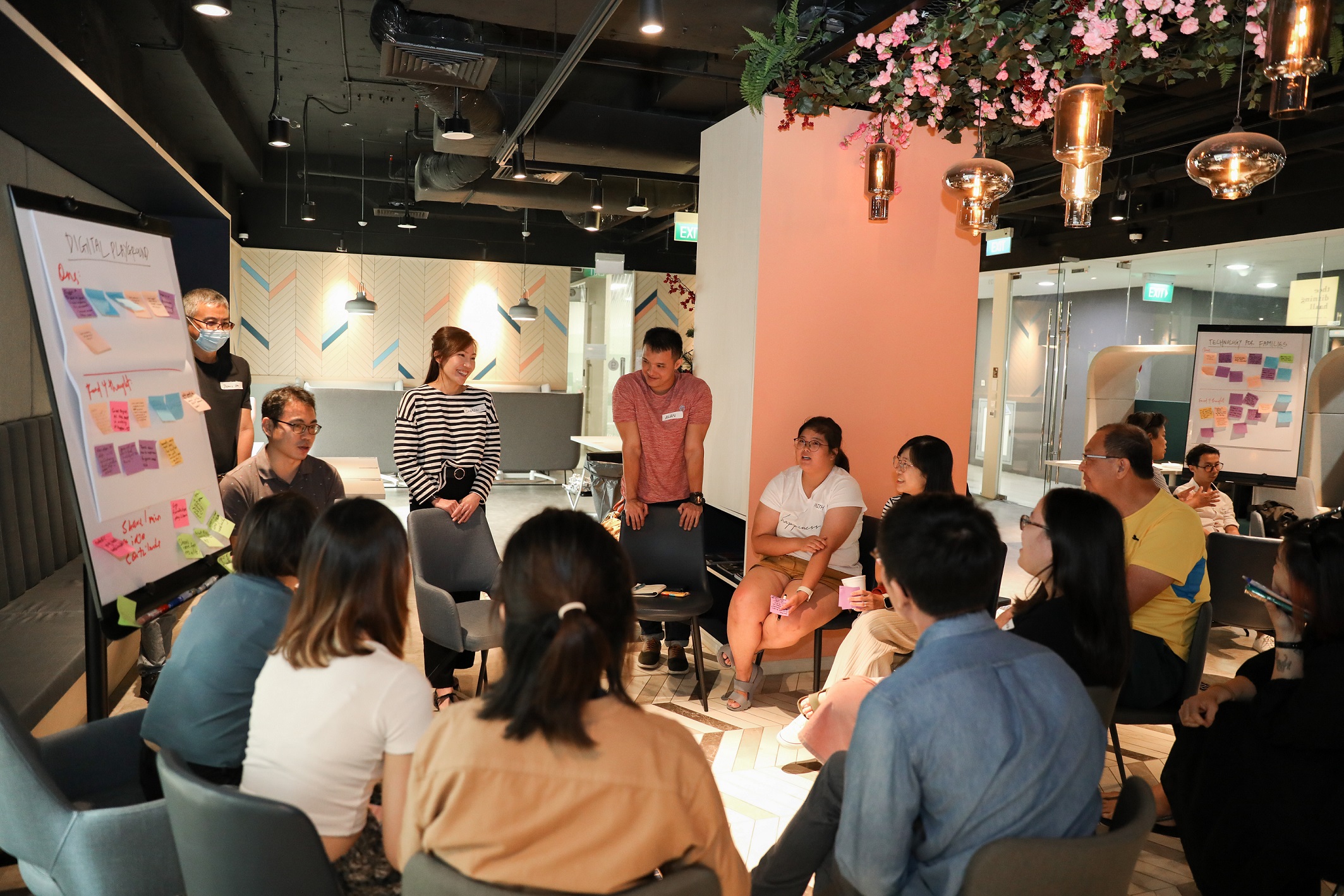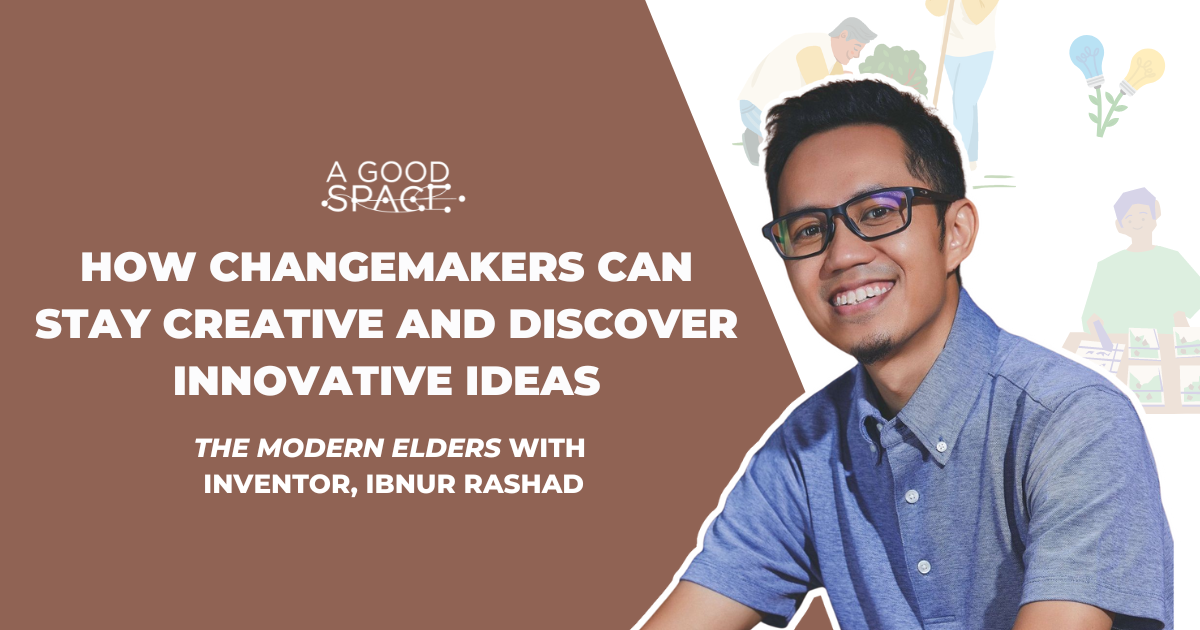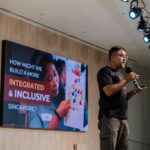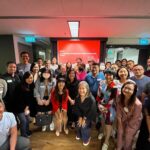How might we make Singapore a more welcoming place for our migrant brothers and sisters to work and live in?
The issues faced by migrant workers in Singapore are complex and cannot be solved by a single organization alone. A year ago. A Good Space (AGS) embarked on a journey to gather 90+ multi-sector representatives from dorm operators, employers, MOM, NGOs, academics, doctors and migrant workers to form a collective for action.
Over several workshops, they scoped out key issues faced by migrant workers, generated ideas and formed work-groups to test their ideas. 3 multi-sector teams were formed and they tested their ideas from Dec 2022 – May 2023.
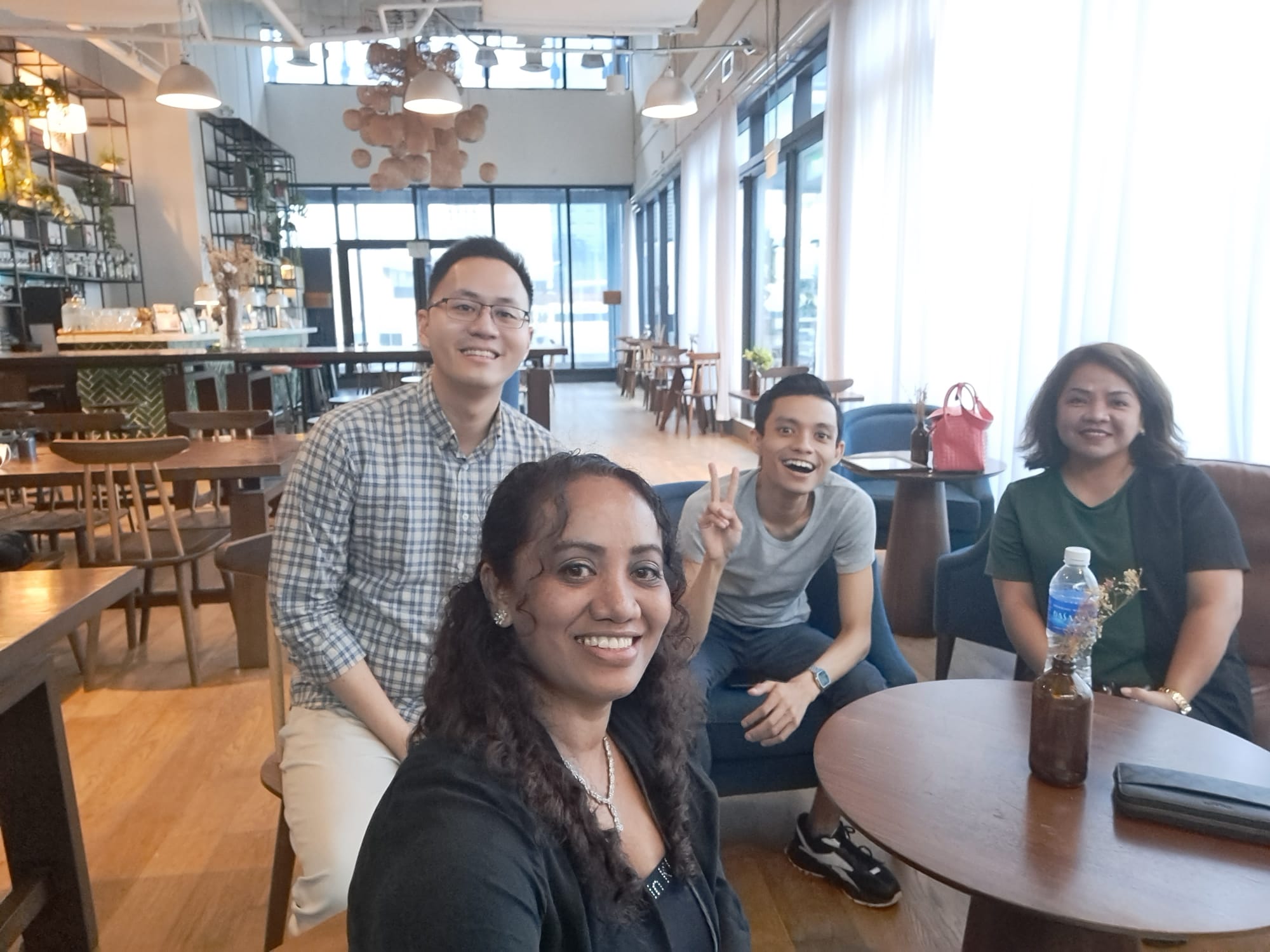
1. Team History Buffs: The team’s idea was to ask MOM to consider enabling Employment Agencies (EAs), and eventually domestic workers, to view the hiring history of potential employers to facilitate better matching and reduce situations of abuse. As part of their prototype, the team conducted two surveys of 268 employers and 49 EAs to understand how this idea can be implemented and possible implications of doing so for all stakeholders.
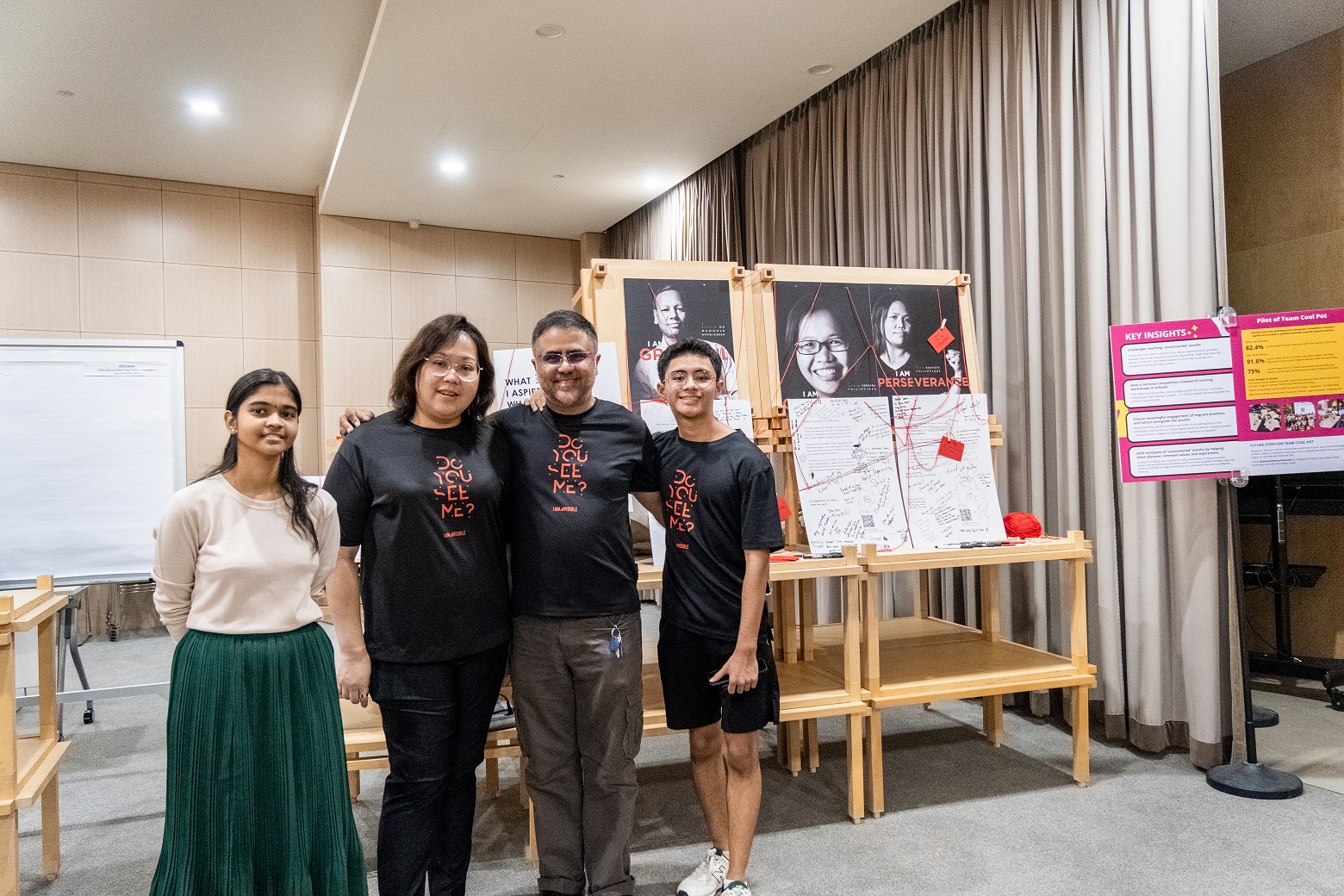
2. Team Cool Pot: To encourage youths to develop empathy towards our migrant brothers and sisters, the team first created experiential workshops for youths to interact and share a meal with migrant workers. After that, they created a digital content competition for youths and migrant workers to produce digital stories to counter negative stereotypes of migrant workers. This prototype saw significant increases in positive attitudes towards migrant workers amongst the 20 youths who attended, many of whom had little prior interaction with migrant workers.
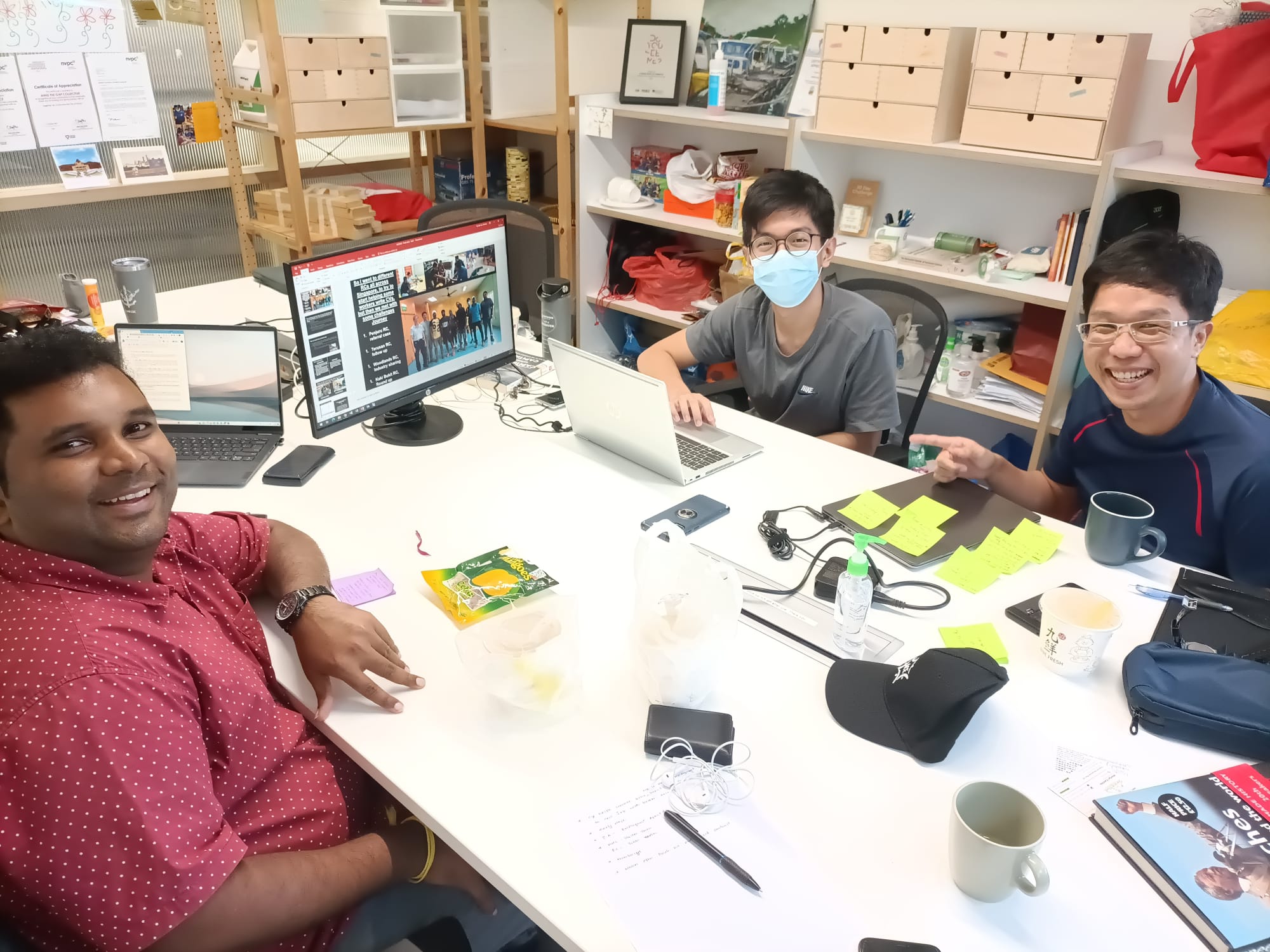
3. Team Good Company: The team’s idea was to help at-shelter migrant workers – workers who have lost their job because their company has gone into trouble – with finding a job more quickly through writing a CV for them. As part of their prototype they wrote CVs for 6 migrant workers and passed them to EAs, in hopes that this will help them find jobs for the at-shelter workers and prevent them from going home and incurring a second round of debt to return to Singapore.
On 25 June 2023, we hosted a Finale event to showcase the results from their prototypes, encourage other citizens and non-profit organizations to partner them to scale their ideas and celebrate the unwavering determination displayed by members of these three work-groups. This was what happened:
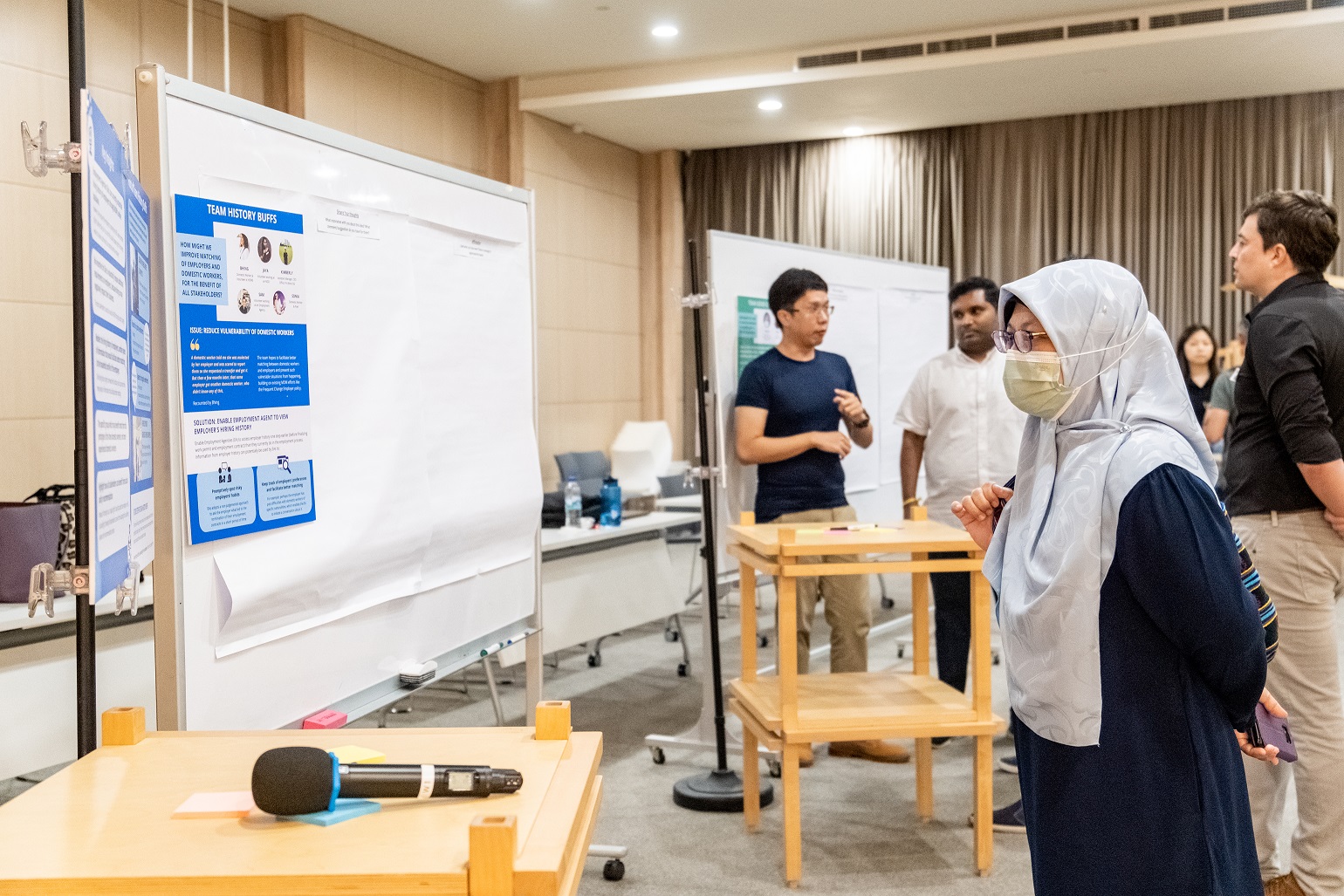
Welcoming guests with a Gallery Walk
The Finale started with a Gallery Walk, where guests were encouraged to visit different booths which showcased the team’s prototypes. Stepping into the Great Hall at Tzu Chi Humanistic Youth Centre, they were warmly greeted by members of the different teams, who shared the results from their prototypes, the issues they identified and valuable insights they learnt.
Besides the three teams, we were also pleased to have Tammy and Mathilda, both graduates of Temasek Polytechnic’s School of Applied Sciences, to share their idea to provide subsidized eye checkups and prescription glasses for migrant workers. Their passion developed when they attended some experiences curated by AGS for Temasek Polytechnic, where they got to learn about migrant worker issues through theater-based games and volunteer with HealthServe to conduct health screening for migrant workers at the Recreation Centres.
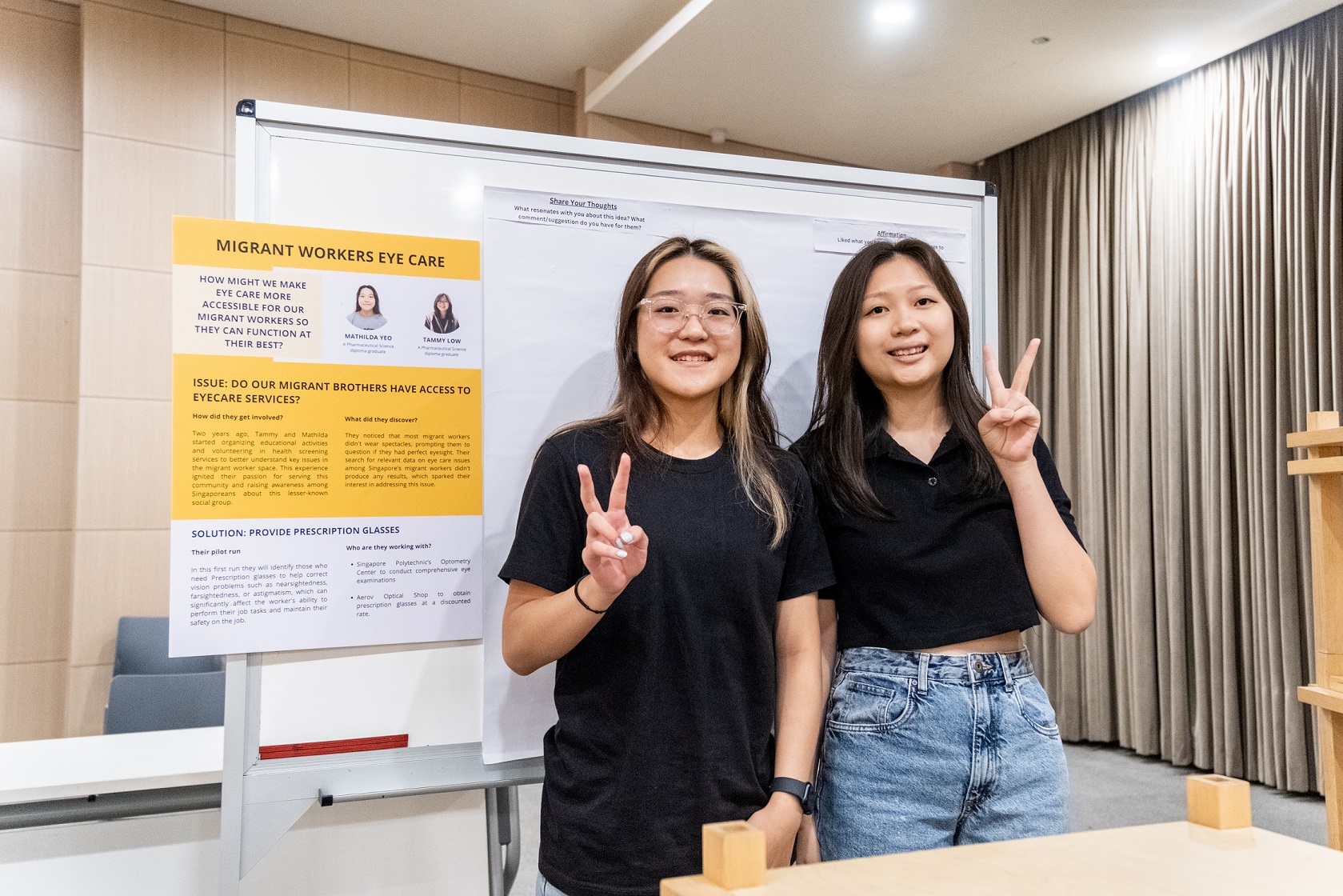
Guests were also invited to share their comments and suggestions for the teams using post-it notes. Soon, the tables for each team were filled with post-it notes with affirmations and ideas for how they could develop their prototype further. We were thrilled to see guests having insightful conversations and reconnecting with fellow changemakers in the migrant worker space even before the event began!
Looking back at the MWL3 journey
Once guests were seated, we wanted to get a sense of who was in the room. Our General Manager Vincent got the ball rolling by asking guests to respond to two questions on Mentimeter: (i) which best describes your involvement with migrant worker issues? and (ii) on a scale of 1 – 10, how well are we doing on partnerships in the migrant worker space?
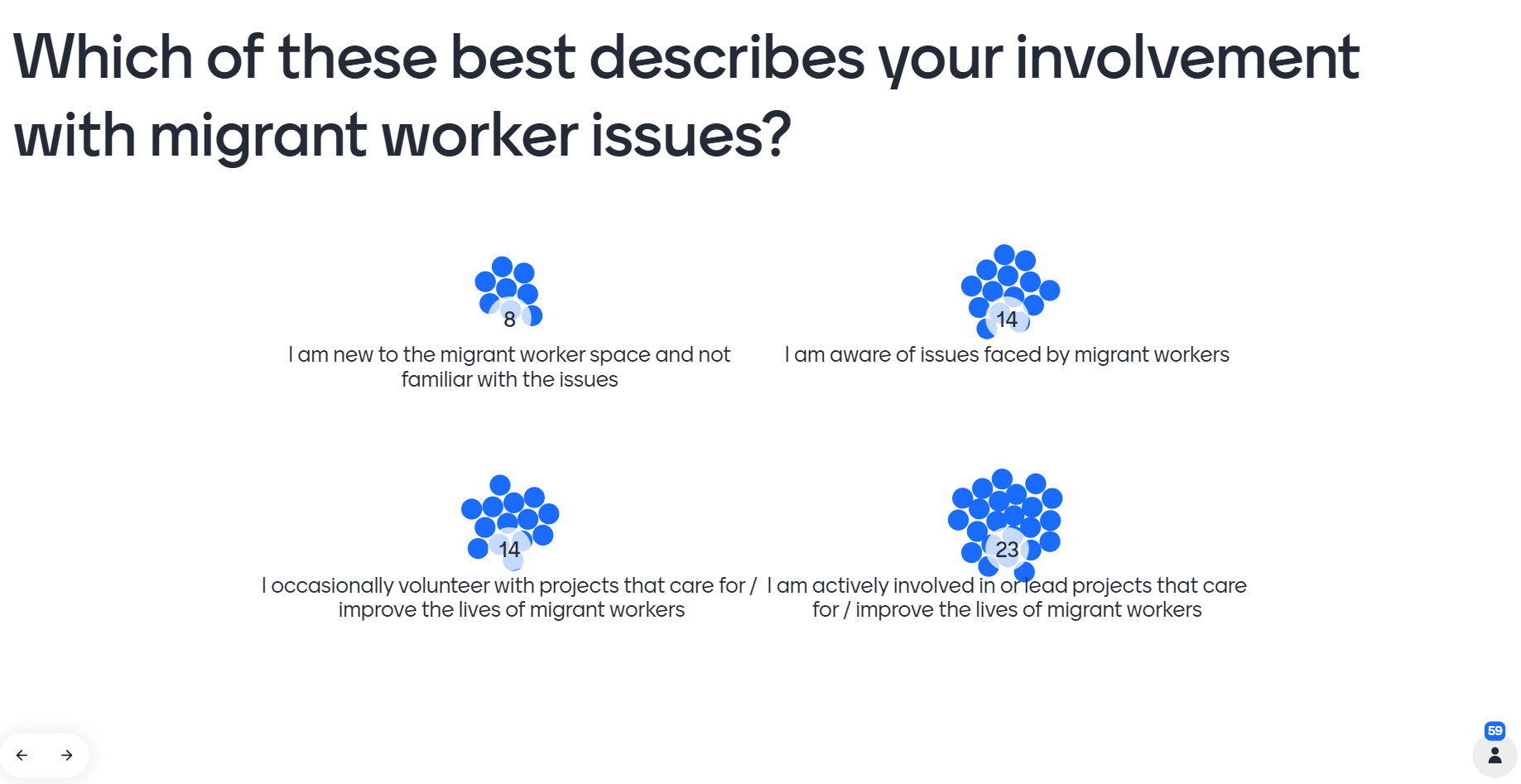
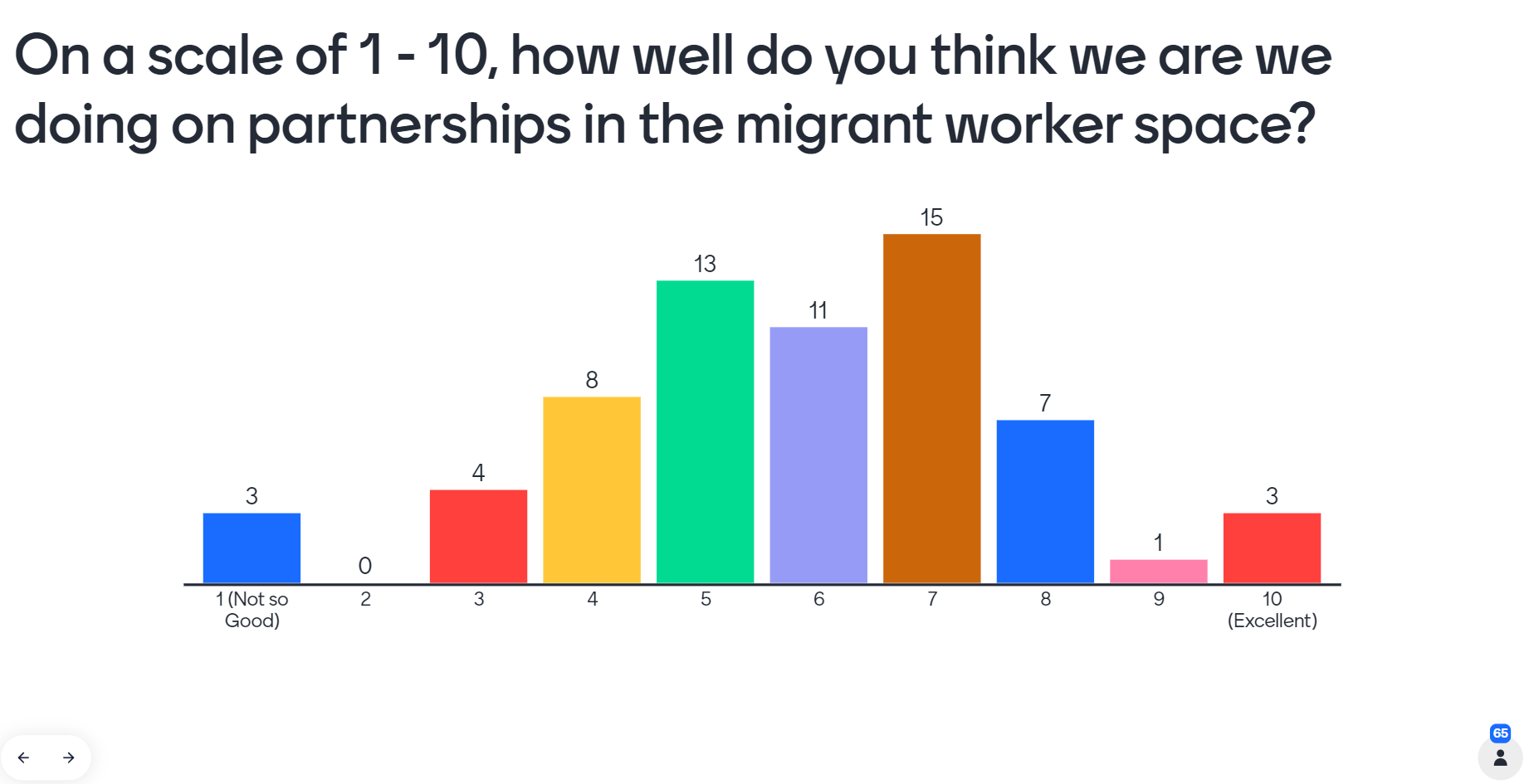
This helped to set the context that today’s event was about celebrating successful multi-sector partnerships and figuring out how we can nurture more of such partnerships in the migrant worker space.
Then, Anthea and Michael, our co-chairs for the MWL3, gave a short opening address to welcome everyone and reflected on the 1.5 year journey we had taken since April 2022 to get here.
2-min elevator pitch
Once the introductions were done, each of the three teams had a chance to give a short, 2-minute elevator pitch of their idea, answering two questions: (i) what is their idea about? and (ii) what was the main challenge they faced?
Sonia from Team History Buffs talked about their challenges in finding a message that can convince employers, employment agencies and the Ministry of Manpower that a policy to enable employment agencies and domestic workers to view the hiring history of their potential employer can benefit everyone.
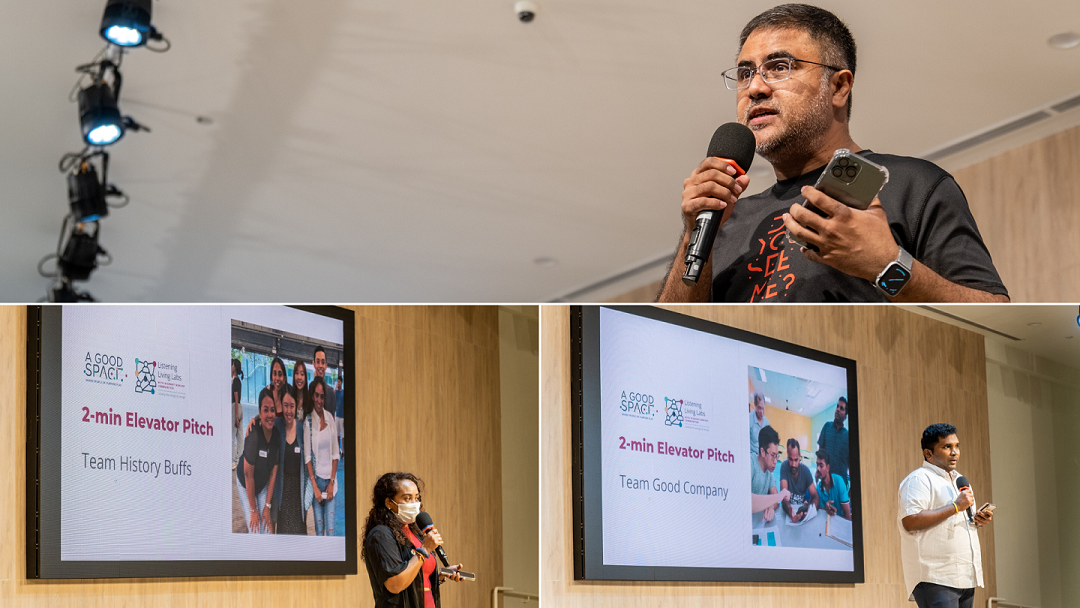
Employers were worried about privacy, employment agencies were worried about how this might impact their business profits and the team had to find a way to emphasize that in the long run, all parties can benefit if this policy can contribute to better matching.
Ash from Team Cool Pot shared their challenges in getting students, who previously had little interaction with migrant workers, to attend their experiential workshops and participate in the competition. Schools were an important partner but it was difficult to align the dates of the workshops and competition to their academic calendars.
Raja from Team Good Company talked about how it took a while to understand what type of migrant worker would best benefit from having a CV. His teammate Yan Hao added that he had difficulty balancing his full-time job with doing the things necessary to push the project forward.
Hearing the team’s challenges helped set the context for the panel discussion, where we invited multi-sector representatives to discuss how we could strengthen partnerships in the migrant worker space.
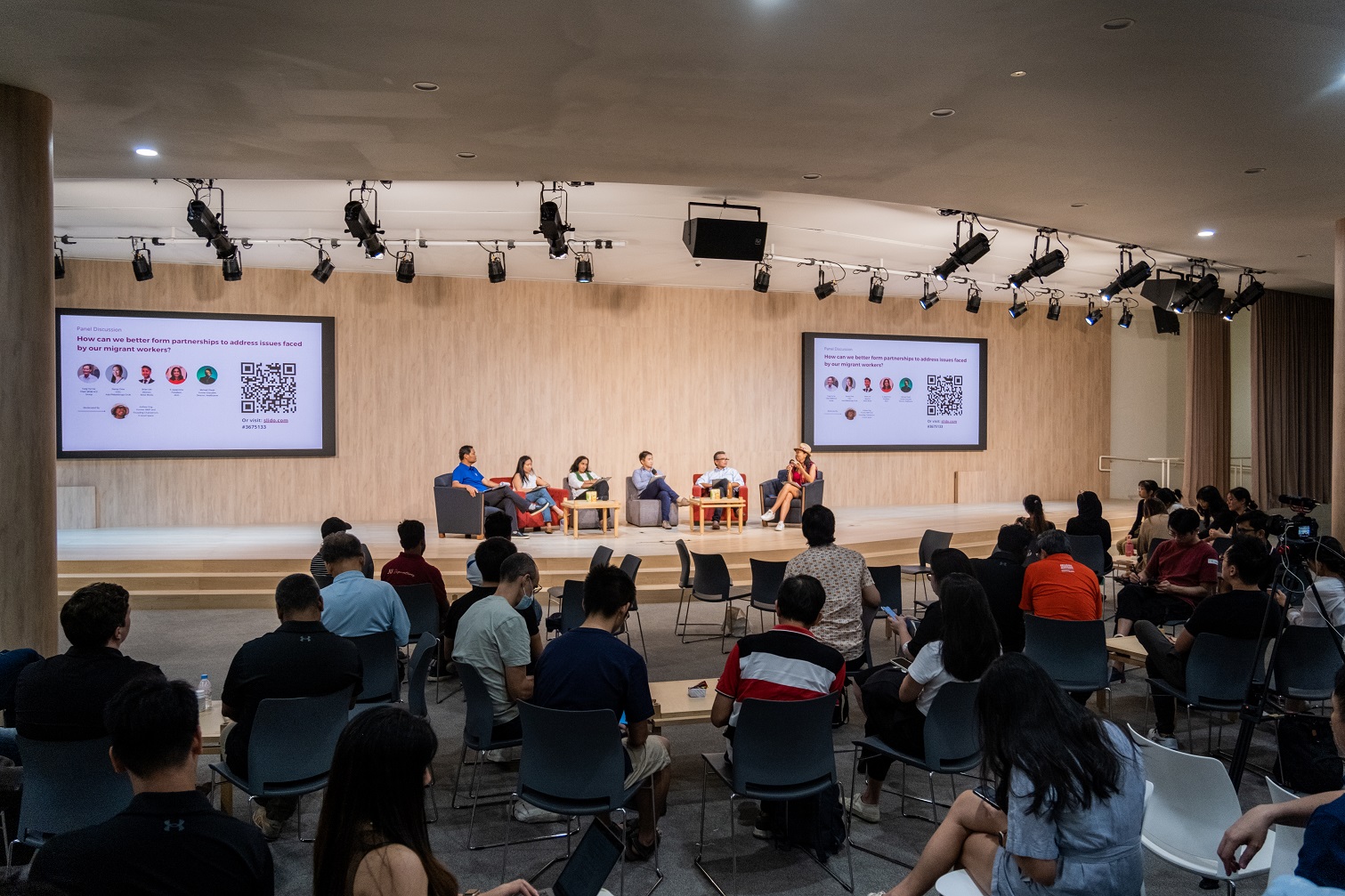
Panel discussion on partnerships
The issues that our migrant workers face are complex, requiring partnerships between multi-sector stakeholders for solutions to be meaningful. Through the MWL3 process, we had both positive experiences and challenges engaging different stakeholders.
Thus, we wanted to organize a panel discussion comprising speakers representing employers, employment agencies, funders, government agencies and non-profit organizations, to discuss how we can help nurture more partnerships in the migrant worker space.
The panelists were:
1. Tung Yui Fai – Chief of Ministry of Manpower (MOM) ACE team, representing the government sector
2. Michael Cheah – Former Executive Director of Healthserve, representing the non-profit sector
3. Stacey Choe – Chief Operating Officer of Asia Philanthropy Circle, representing funders and philanthropists
4. Brian Lim – Director of 8DGE Works, representing the private sector
5. K Jayaprema – President of Association of Employment Agencies, representing Employment Agencies
The panel was moderated by Anthea Ong, founding Chairperson of AGS and former Nominated Member of Parliament. Some of the key points discussed by the panelists are:
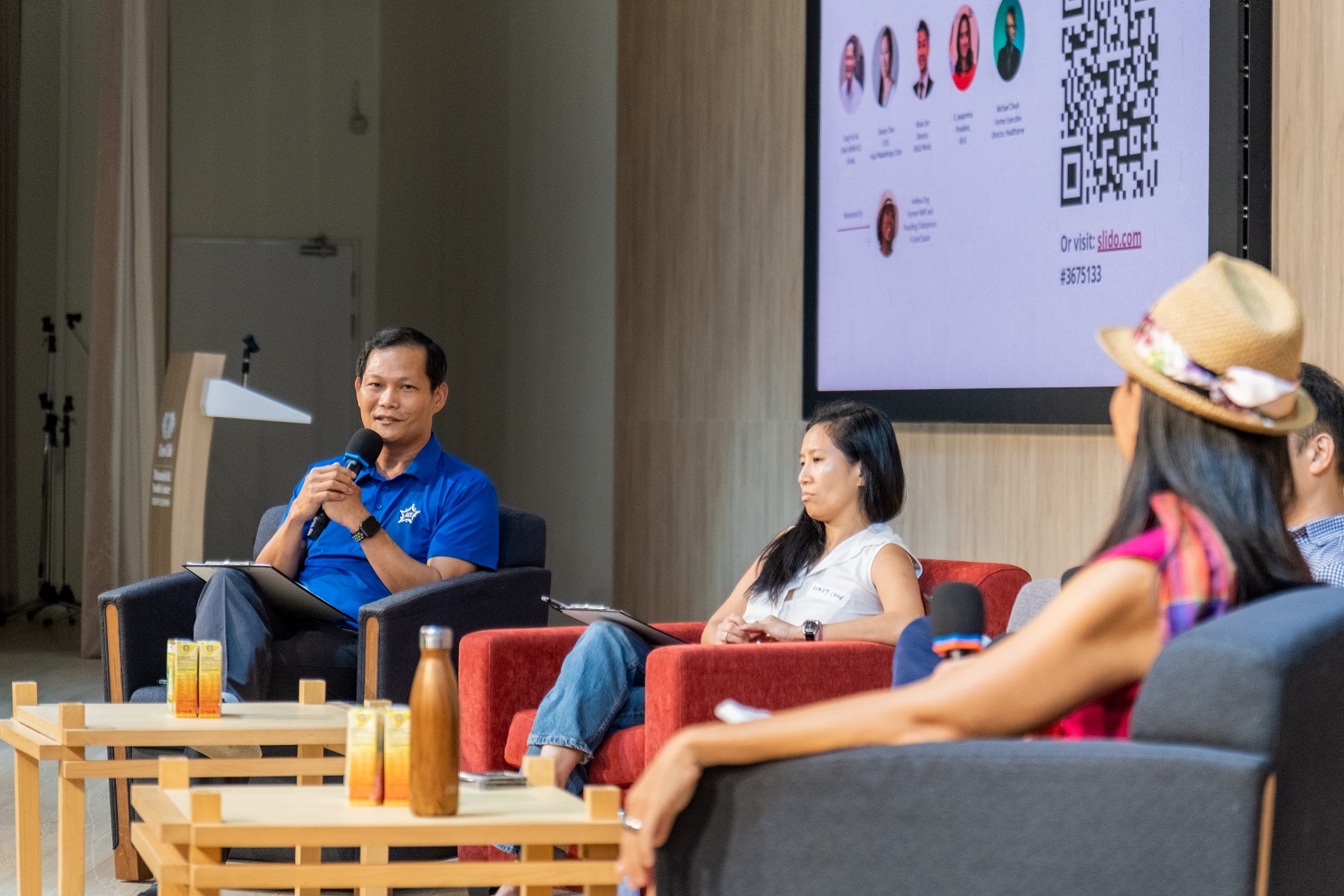
1. A key strength that the People Sector, comprising non-profits and Ground-Up groups has is their close connection to the ground – This enables them to see gaps or niche issues affecting a smaller group of migrant workers that the government might not be aware of. Therefore, the People Sector plays an important role in stepping forward with a good opportunity statement or new partnership ideas they see. It should not rely on the government alone to drive change for migrant worker issues.
2. Beyond funding outcomes, there is also a need for funders to recognize the importance of funding the process that led to the outcomes – For example, instead of looking at the social impact of the Migrant Worker Listening Living Labs as just the 3 work-groups that have emerged, funders can give more importance to the 1.5 year long process of workshops, dialogues with stakeholders, documentation done by Secretariat team, etc as all important pieces of work that led to the formation of these 3 work-groups. Outputs such as number of participants, the total number of volunteer hours contributed and the monetary value of those volunteer hours can also be used to justify why the process should be funded.
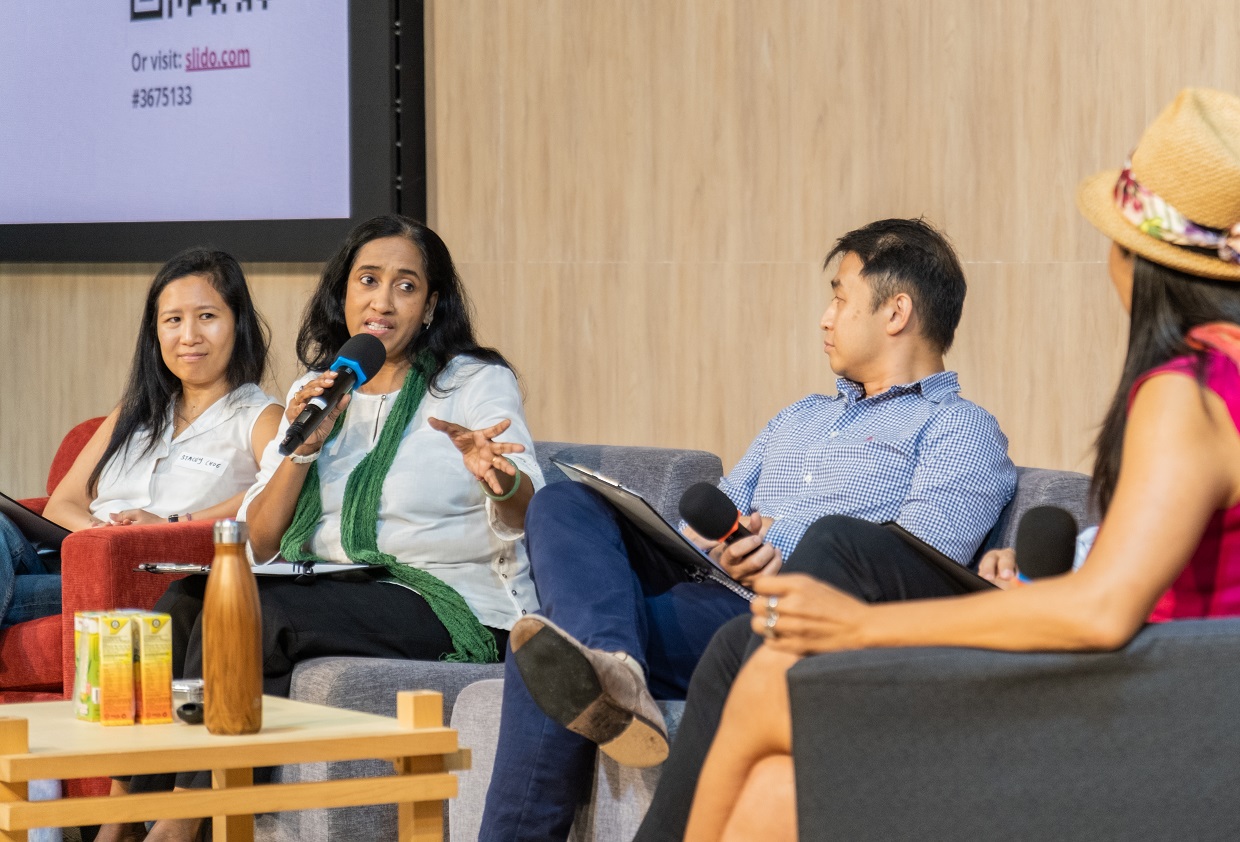
3. If you’d like to partner employers, highlight the short-term gains they can receive if they were to be engaged with your idea – Be very results oriented rather than communicating in general or abstract ways about the social impact that can be created. If you can demonstrate how your idea can lead to increased profits or cost savings (which indirectly leads to higher profit), employers would be more receptive.
4. When partnering employers of migrant workers or employment agencies, be mindful of creating an environment where they can feel safe to participate and share authentically – Oftentimes, employers and employment agencies are portrayed as the ‘bad guys’ in the media. While the malpractices of a few bad employers or agents get covered by the media, good initiatives by employers or agents to take care of their workers aren’t covered as much because bad news always captures public attention. This leads to a reluctance of these two important stakeholders to participate, for fear that they would be attacked.
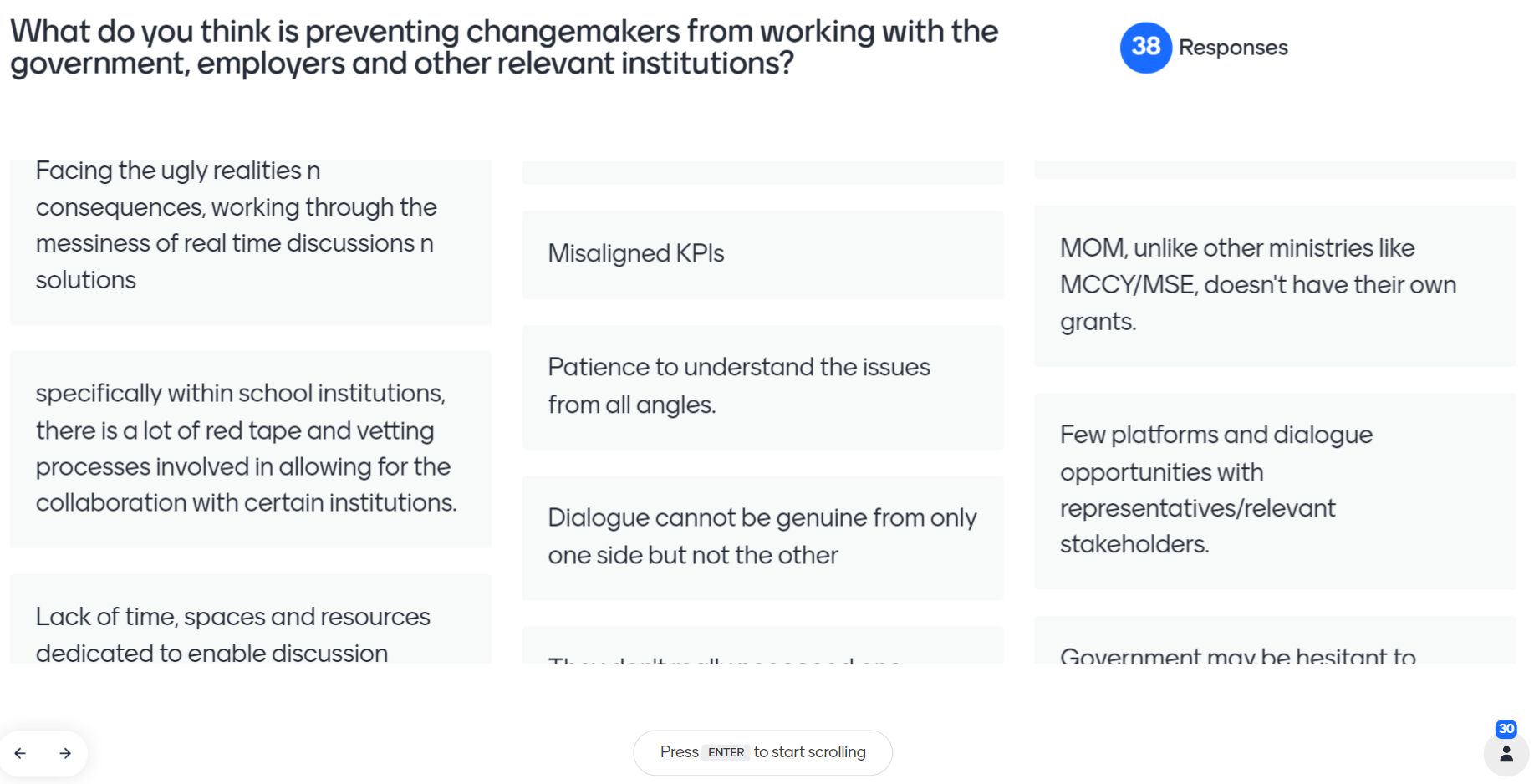
Following the sharing by the panelists, participants were invited to ask questions in a short Q&A session. Participants asked questions ranging from how the government planned to engage the public on migrant worker issues post-pandemic to how we could recognize good employment practices as a step in the direction of ethical hiring and recruitment.
As it was a panel about partnerships, we asked participants to share what they felt was preventing changemakers from working with the government, employers and other relevant institutions. A summary of their responses can be found in the image above.
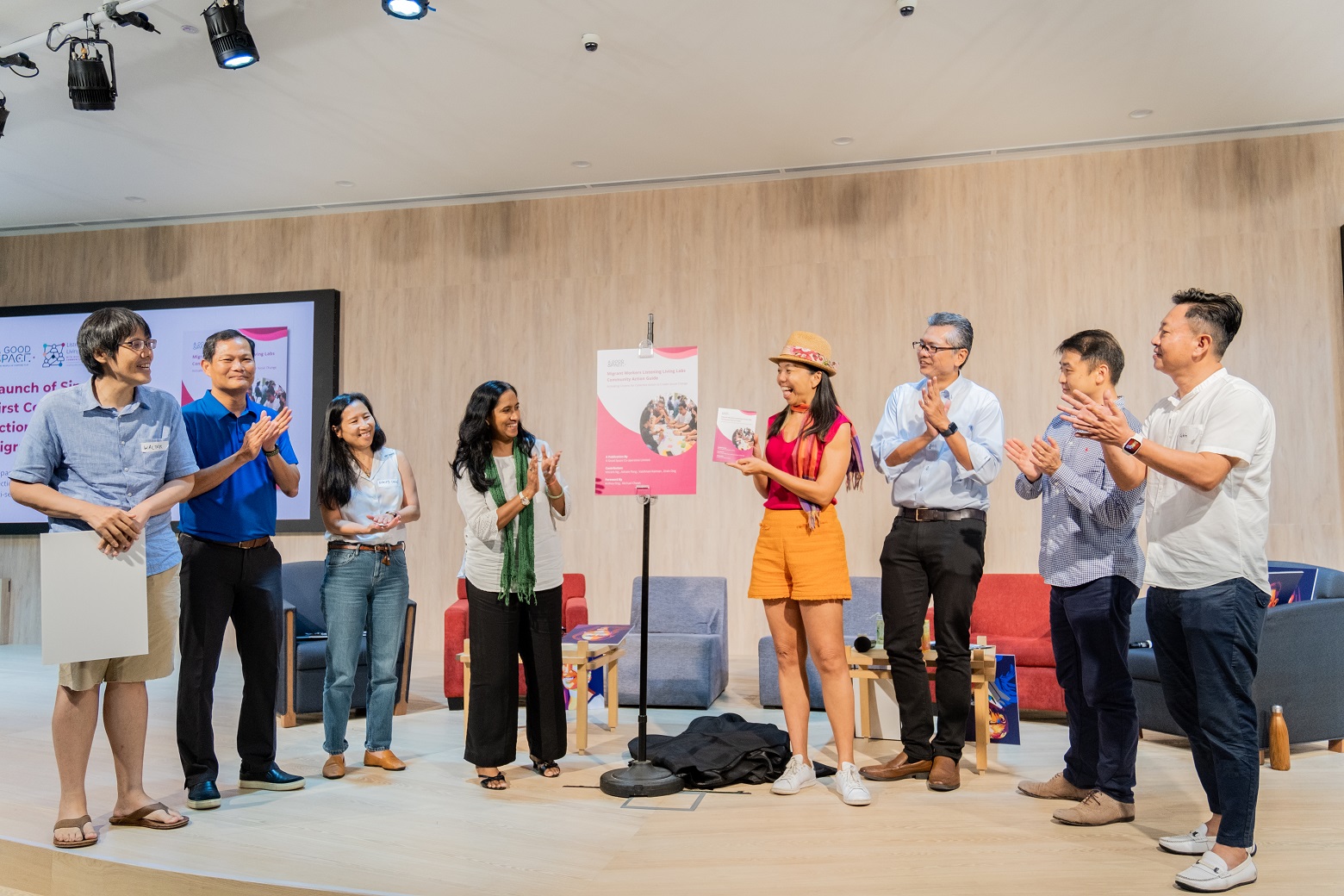
Launch of the Singapore’s first Community Action Guide for Migrant Workers
After the panel, we invited the panelists and Anthea to officially launch Singapore’s first Community Action Guide for Migrant workers. Written by AGS, this is a 166-page guide containing our key reflections from running the MWL3 over the past 1.5 years, tools we used to design the workshops and valuable insights learnt by the three work–groups through their prototypes.
We hope to contribute this guide to other changemakers looking to convene similar multi-sector collectives for the complex issues that lie ahead for Singapore, so that they can start off from a stronger footing than we did.
As the 4G Leadership embarks on the Forward Singapore exercise to partner citizens, we hope this guide adds to the social sector’s knowledge on how the government and formal institutions can harness the potential of citizens.
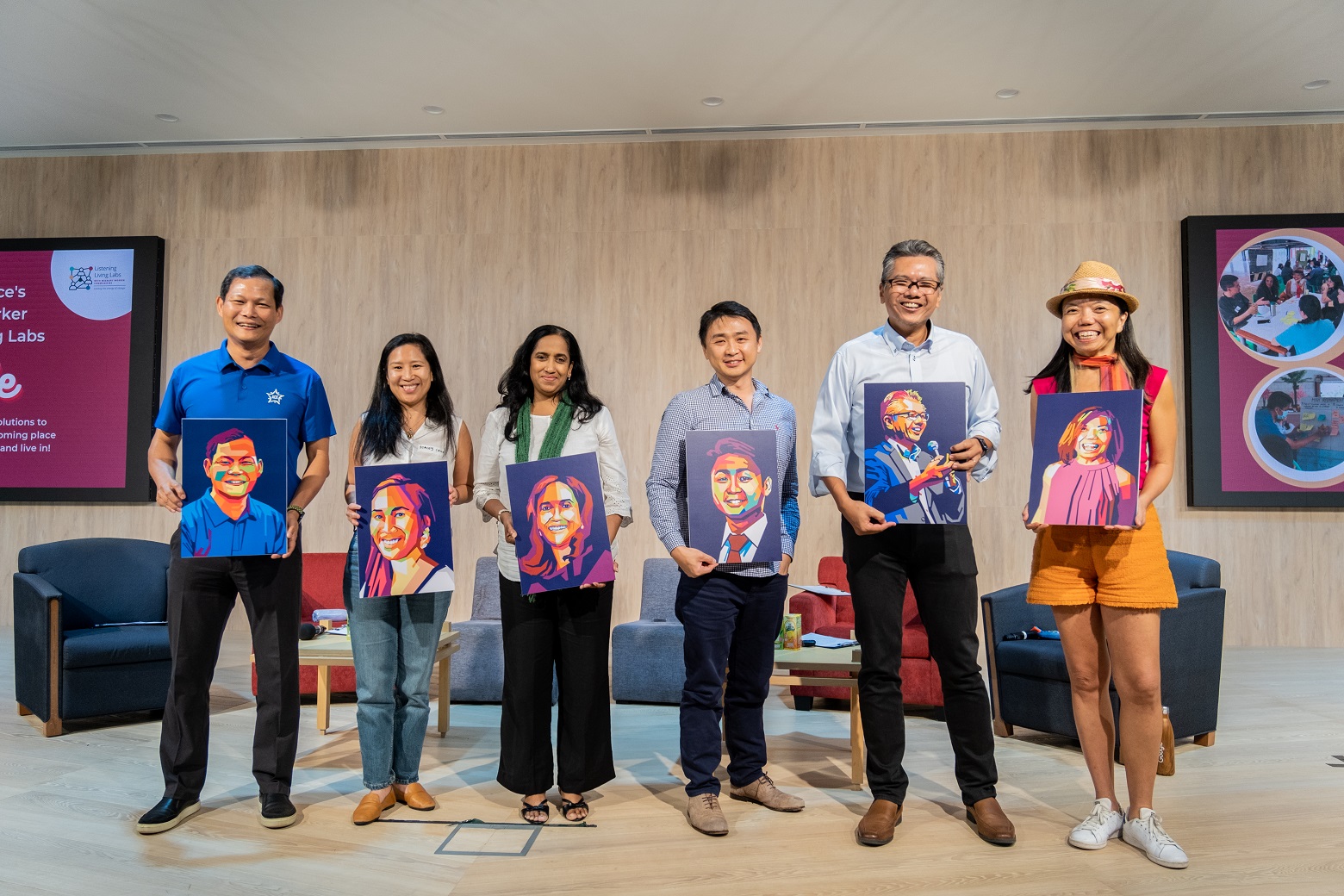
We gave a copy of the guide and a small token of appreciation to the panelists and persons who had played a pivotal role in the MWL3. If you’d like to access a digital copy of the guide, please visit: https://agoodspacesg.gumroad.com/l/mwl3cag and use the code MWL3FINALE to get a complimentary copy.
A rejuvenating performance by migrant sisters!
After an intellectually stimulating panel discussion, we went for a short break for guests to rest and recover. When they returned, they were treated to two exciting rejuvenating performances given by two groups of migrant sisters in Singapore.
The guitar interest group from HOME performed a moving guitar medley of various popular songs that had the audience singing and smiling along! The sisters who played at the finale were Mary A. Palabay, Rhea M. Go, Raquel, S.Ello, Rachelle Julian, Judy Cuizon and Kharl Aquino.
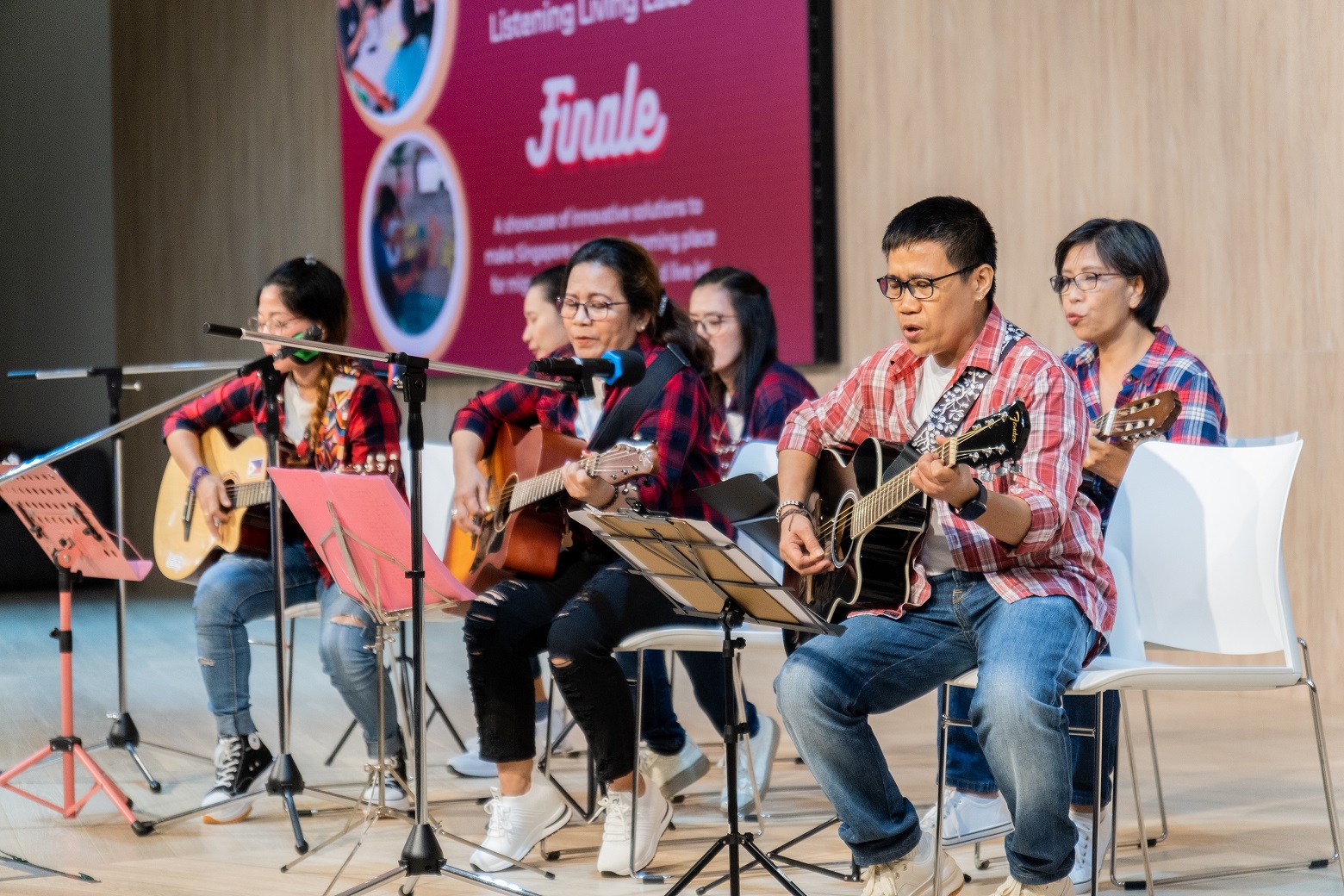
There was also a power packed dance performance given by Heraldine Salva, Joan Lope, Mayflor Fuggan, Juvy Mirasol and Daisy Jimenez. The dancers changed their dance moves each time the music changed, enabling the audience to appreciate a variety of dance styles.
Our migrant brothers and sisters have so many hidden talents and are more than their job titles. We are grateful that the scheduling and logistics worked out for these two groups of migrant sisters to perform at the Finale.
Presentation of key insights by work groups
The next segment of the Finale saw each of the three work-groups giving an 8-minute presentation on what they did for their prototype and the key insights they learnt.
Pitch by History Buffs
First was the presentation by Team History Buff’s members Bhing, Sonia and Adriale. Bhing started the presentation by recounting a story of a domestic worker she knew who was molested by her employer but did not report it because she was afraid that no one would believe her and she would be sent home. While this domestic worker eventually got a transfer to another employer, that same employer hired another domestic worker a few months later.
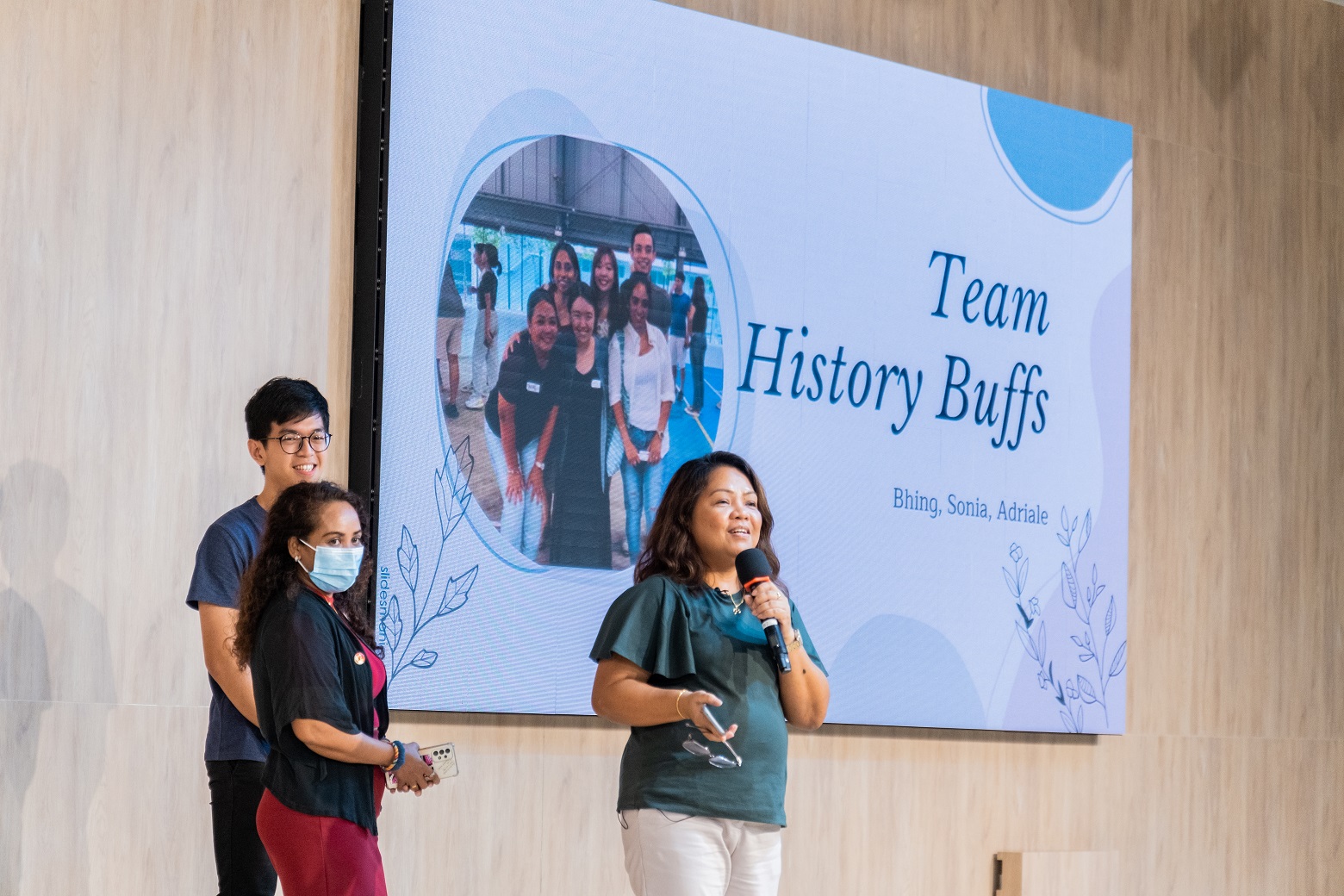
This made Bhing feel very uncomfortable because the same situation could happen again. So the team wondered what if there was a way for domestic workers to know more information about their employer beforehand, especially for first-timers?
After speaking to different stakeholders, they came up with the idea to ask MOM to enable employment agencies and domestic workers to view the hiring history of their potential employer. This could help facilitate better matching, which is an outcome that MOM, employment agencies, employers and domestic workers themselves all want.
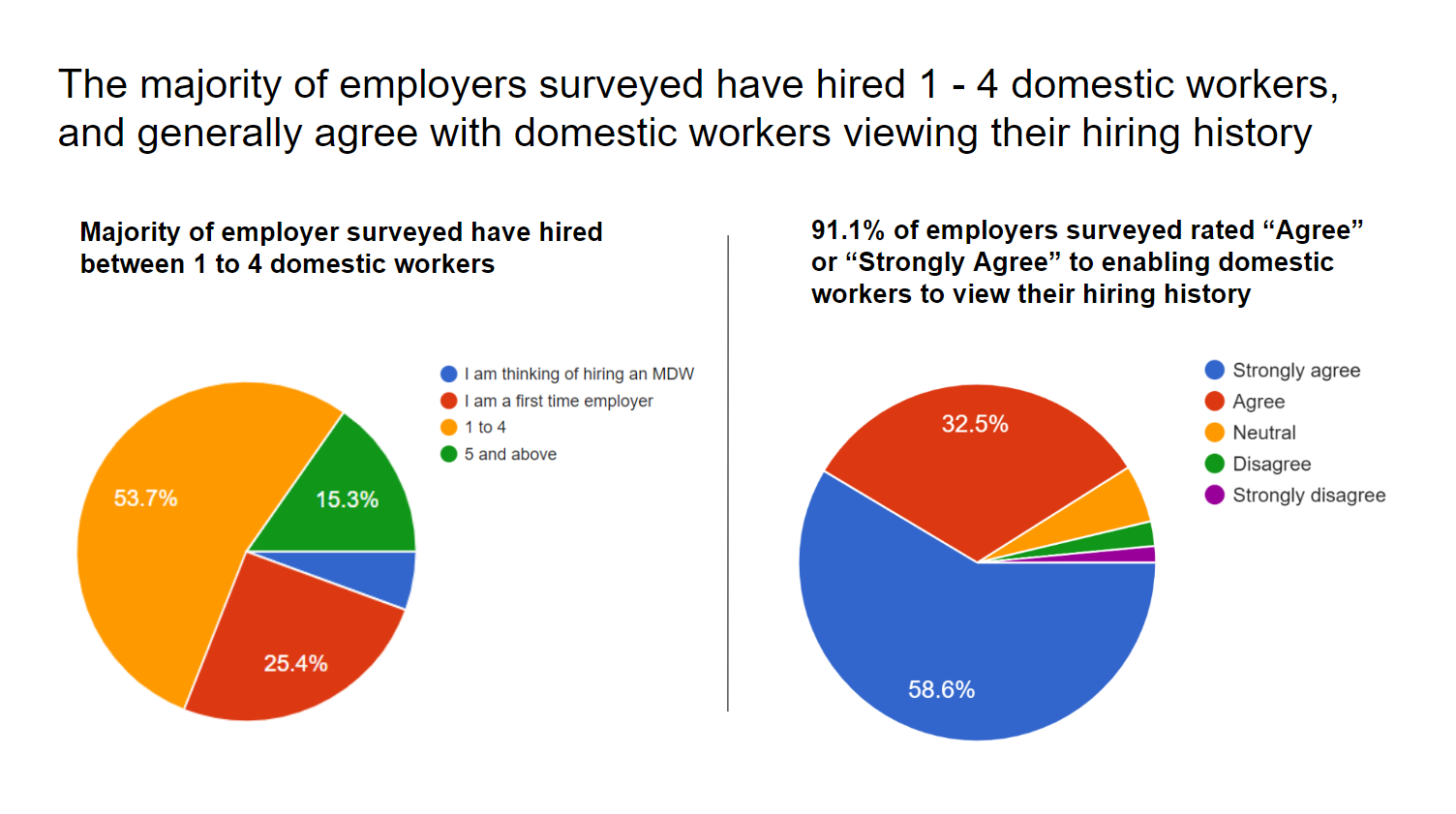
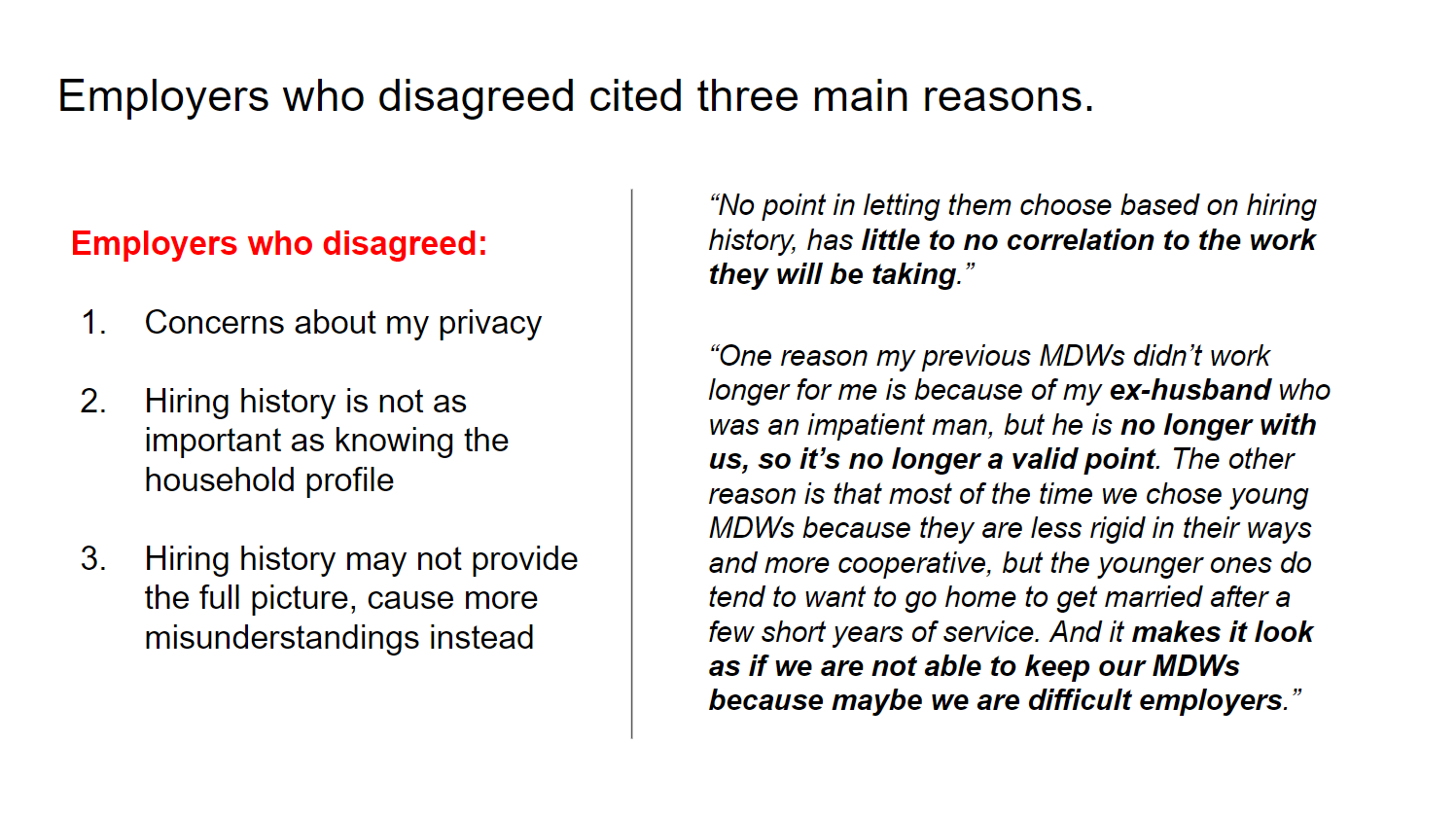
To find out what employers or employment agencies would think about this, the team conducted a survey of 268 employers and 49 employment agencies and discovered that most employers surveyed seemed open to enabling domestic workers to view their hiring history, with the top reason cited being fairness.
Other reasons include: helping to build trust and goodwill with a domestic worker for a longer-lasting employment relationship and enabling them to come in more prepared to handle the expectations and requirements of the employer’s household.
On the other hand, the employment agencies surveyed think that the hiring history of employers is more useful for EAs than domestic workers. The top reason cited was that domestic workers may not know how to interpret and utilize the information.
Instead, it is the employment agencies that have the experience to make inferences based on the hiring history, and are in a position where they can probe deeper and ask employers non-confrontational questions about why their hiring history is the way it is, so as to make a better recommendation and increase the likelihood of better matching.
This change has to be driven by MOM as employment agencies currently have no strong incentive to ask employers to reveal their hiring history, as this is an additional piece of information they are asking that may cause them to lose customers to other employment agencies.
Pitch by Team Cool Pot
Next, Ashokan (Ash) shared Team Cool Pot’s findings from their prototype – organizing workshops for both youths and migrant workers to interact with each other, eventually leading to a mini competition for digital stories to counter negative stereotypes of migrant workers.
The team had intentionally focused on reaching “unconverted” youths – those who may not naturally seek out interactions with migrant workers. In organizing the workshop, they learnt that an effective way to shift mindsets of ‘unconverted’ youths towards migrant workers was to help them discover values and stories they shared with migrant workers.
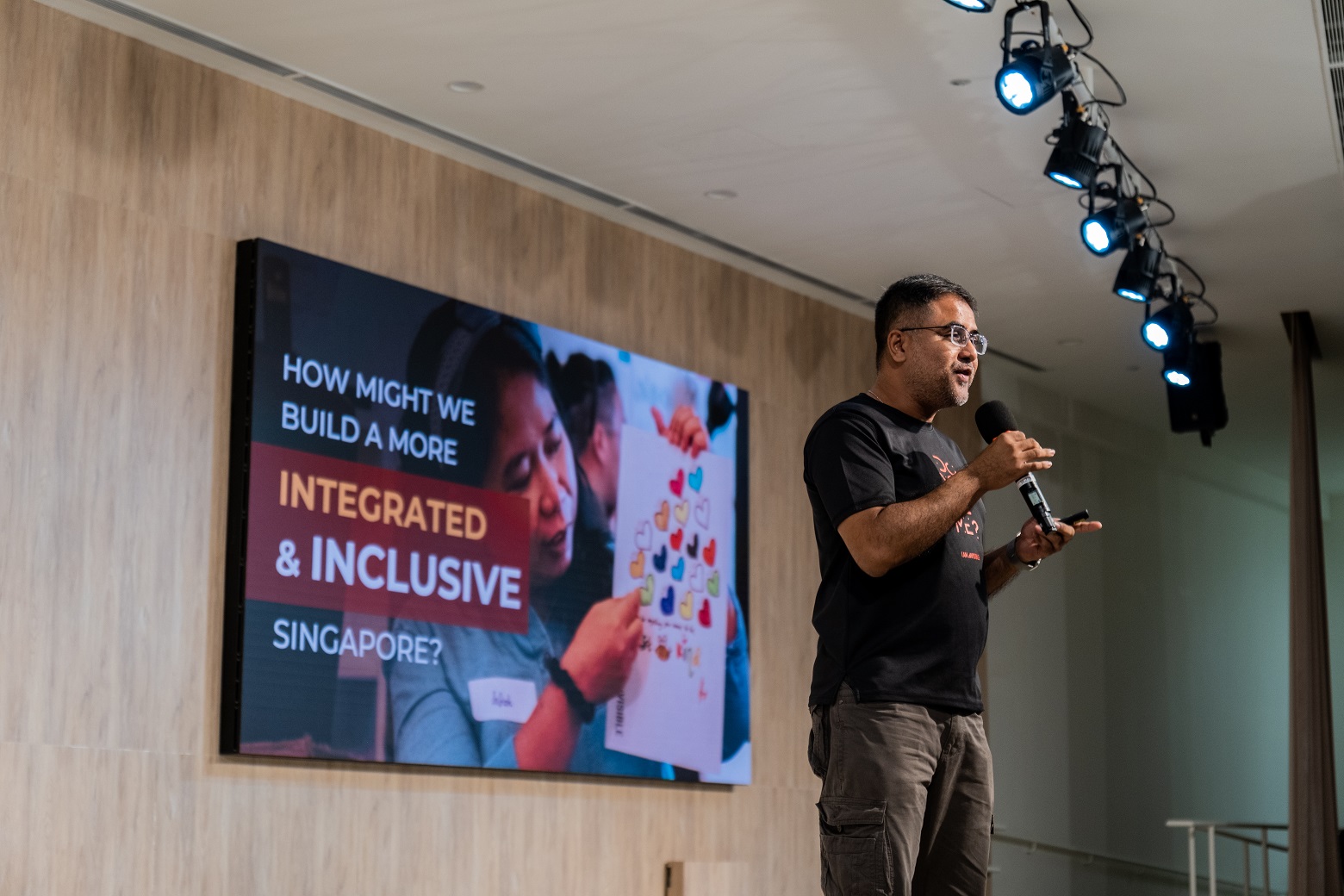
To do this, they encouraged youths and migrant workers to share their long-term goals and aspirations with each other and find parallels between their stories, such as suffering a heartbreak when a relationship ended. These shared emotional experiences helped youths to feel more connected to migrant workers and vice versa, despite their differences in nationalities, cultures and backgrounds.
Of the 20 youths that participated in the workshop, almost 91.6% indicated that they were more likely to interact with migrant workers after the workshop. When asked to use a word that comes to mind when they hear the term ‘migrant worker’, words such as “friend, inspirational, approachable and caring” emerged. 75% of youths also said they were likely to recommend the workshop to a friend.
Ash also shared the winning entry of the competition they piloted together with the workshop, where youths were invited to create digital stories to counter negative stereotypes of migrant workers. Titled “Tita”, the winning entry moved many participants in the room with its story, told from the perspective of a youth talking to a domestic worker who had raised him and was now going home.
Ash ended his sharing by inviting guests working in schools or the private sector to bring the workshop to their students and staff. He also shared the team’s goal to secure some funding to grow the idea into Singapore’s first national digital storytelling competition for migrant worker stories.
Pitch by Team Good Company
The last pitch was made by Yan Hao from Team Good Company, who shared his team’s idea to write CVs for at-shelter workers – workers whose companies have run into trouble and are currently living in a transition shelter with an urgent need to find a job to stay in Singapore.
Migrant workers pay between $6,000 – $10,000 in agent fees to come to Singapore to work, a debt that can take months, even years to pay and often causes them great stress. Yan Hao discovered that this issue of recruitment debt was large and complex and wondered if there was something small his team could do to chip away at the problem.
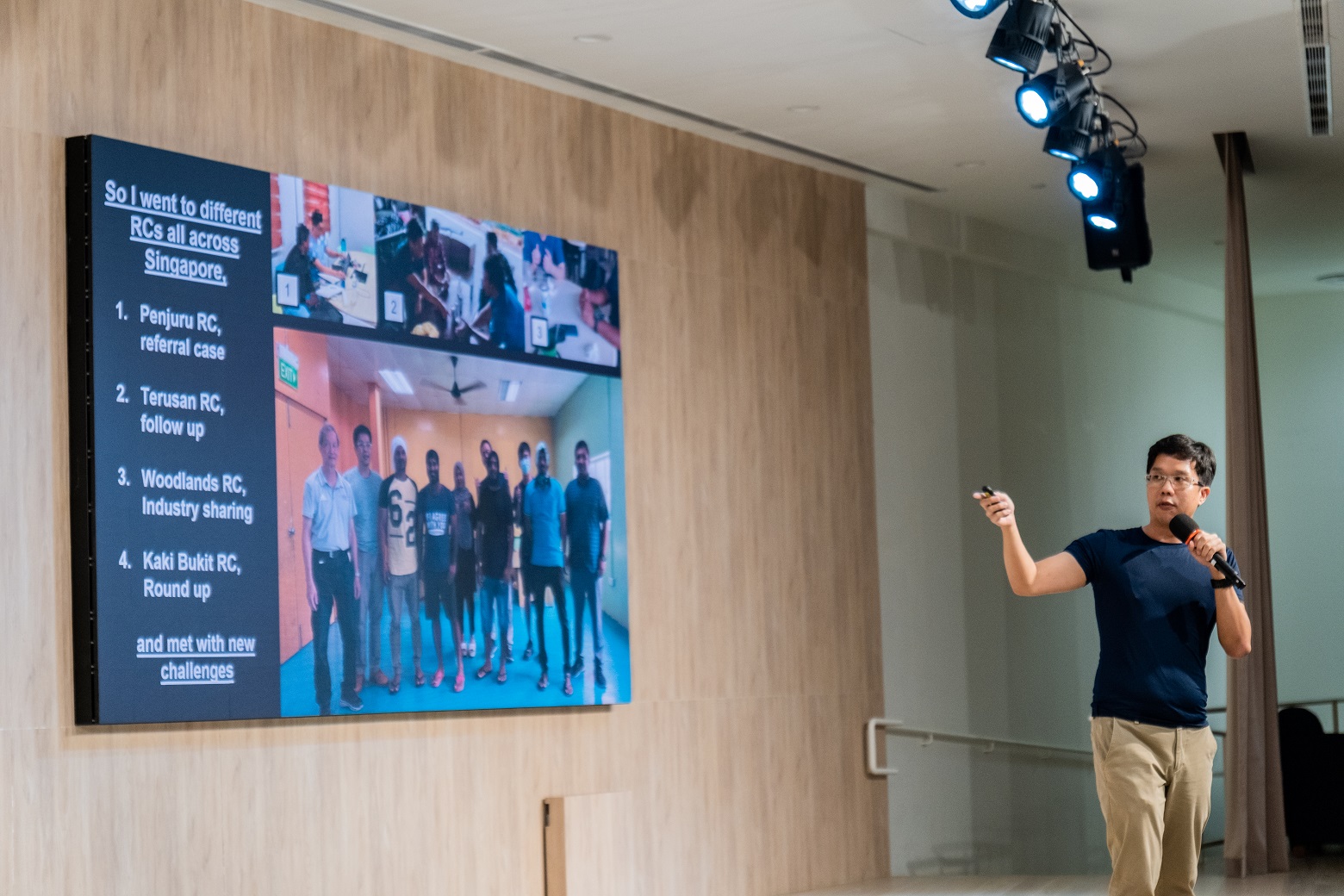
After speaking to several employers, he discovered that workers who are finishing their contract and wish to find a new job to stay in Singapore often have to pay an agent fee again. Instead of tackling the agent fees at the source countries like Bangladesh and India, Yan Hao wondered if he could create something that would help workers already in Singapore to find a job more easily, reducing the agent fees they need to pay.
His initial idea was to write CVs for these workers but received feedback from migrant workers, employers and non-profit organizations that employers only look at CVs for S Pass holders, not work-permit holders. Also, some workers shared their fear that “if my employer finds out I have a CV, they may think I am looking for a new job and not treat me well.”
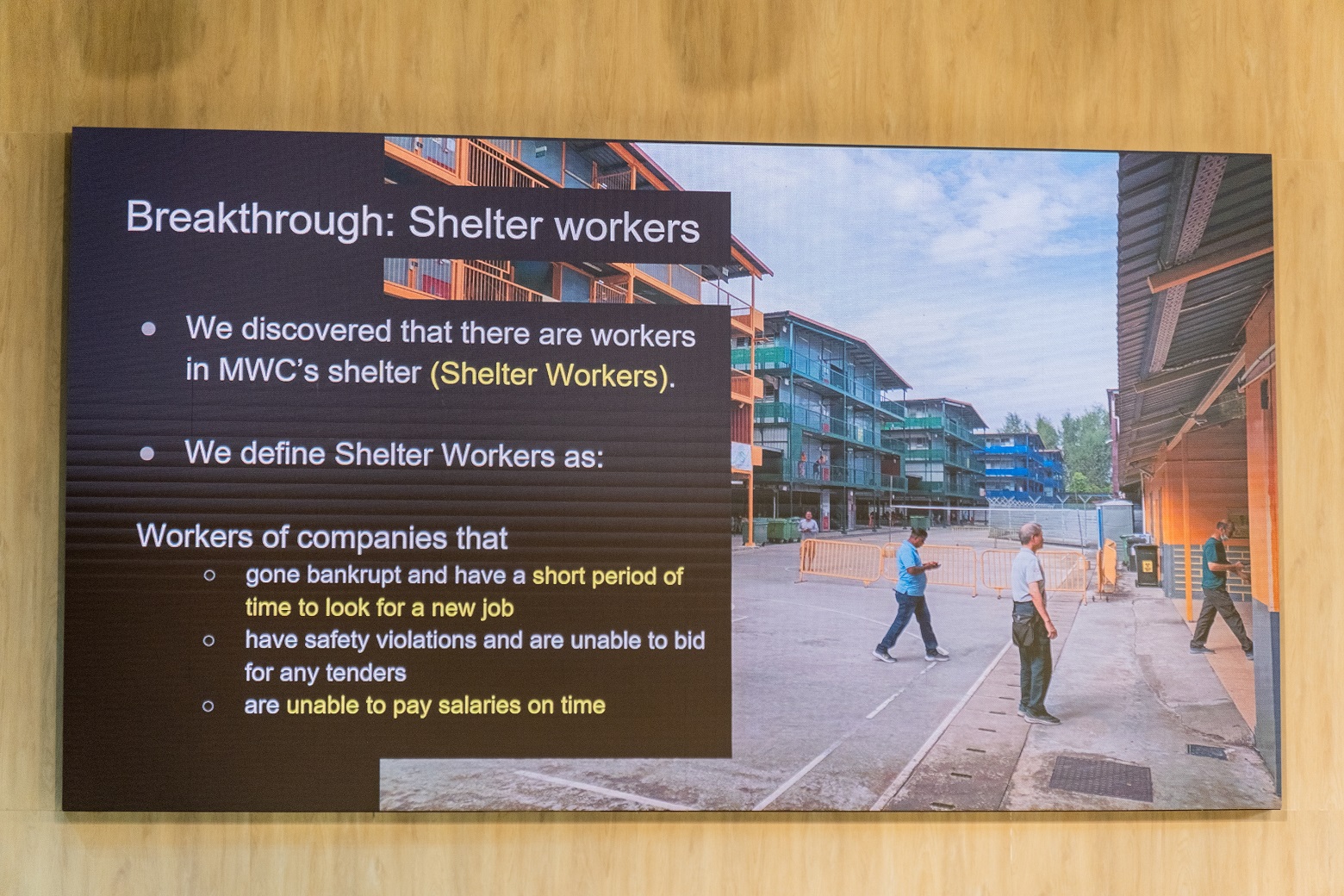
The breakthrough for the team came when they met the Migrant Workers Centre and learnt about the existence of at-shelter workers. They discovered that at-shelter workers are the specific group of migrant workers who will benefit from having CVs and that employment agencies are the specific audience that would benefit from receiving CVs, not employers.
With the CVs written, these agencies can quickly understand the worker’s qualifications instead of painstakingly verifying each certification, which could enable them to secure a job for these workers more easily. Therefore, this can help the worker avoid having to incur additional debts to return to work in Singapore.
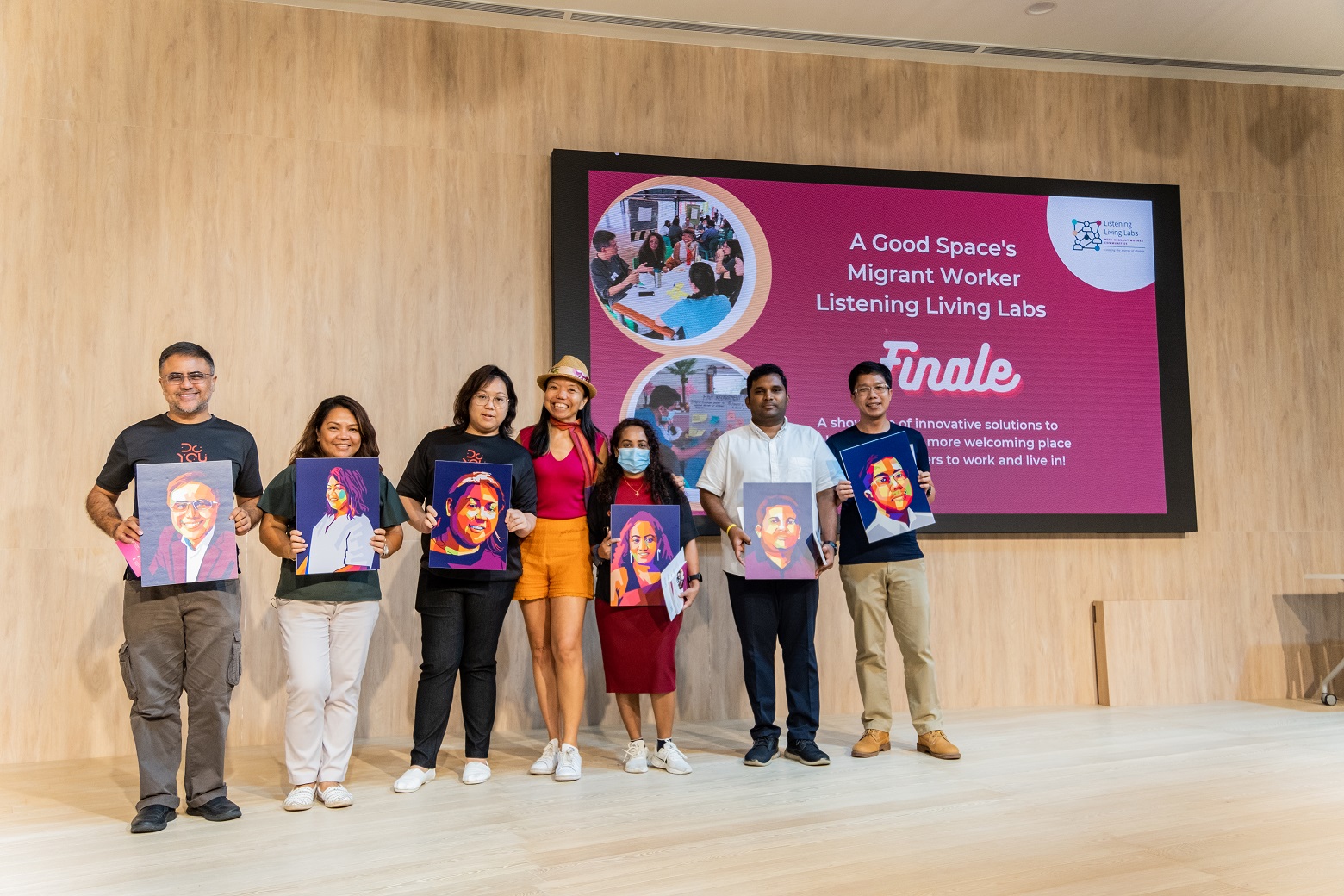
At the end of the three pitches, we presented each work-group member with a token of appreciation to laud their tireless efforts. The Finale ended with new hopes that with more partnerships, we can create a more welcoming environment for migrant workers in Singapore. We can always do something from where we are, with what we have.
Next steps for the teams
While the MWL3 process has concluded, the work-groups are continuing to build on their prototypes to create greater social impact. Team History Buffs will be presenting their survey findings to MOM to lobby them to consider conducting a more extensive research study in view of enacting the policy recommendation.
Team Cool Pot will conduct more empathy-based workshops and organize their national digital content competition in the month of September, with hopes that this can be an annual competition to continue countering negative stereotypes of migrant workers.
Team Good Company will continue to work more closely with the Migrant Workers Centre, to help more at-shelter workers to write their CV, in hopes that this can lead to a successful job placement for a worker and eventually training more volunteers to assist the workers with creating their CVs.
